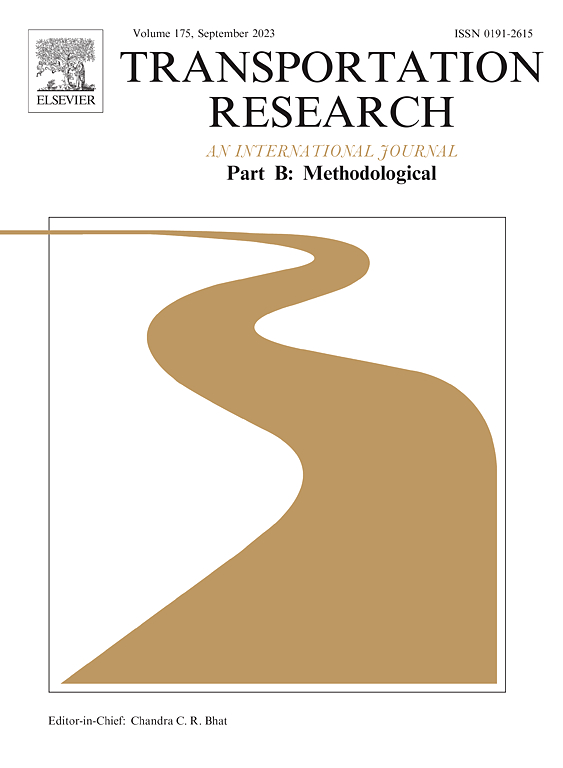Who should not share? The merits of withholding unused vehicles
IF 5.8
1区 工程技术
Q1 ECONOMICS
引用次数: 0
Abstract
People repeatedly demand travel, using available vehicles scattered around space. What can justify vehicle withholding (i.e. preventing others from using it, for own future use) from the social welfare perspective? This paper investigates heterogeneity in the potential cost of search for alternative vehicles as such justification. It is shown that travellers whose search cost is substantially higher than that of others (e.g. limited-mobility people) can optimally withhold a vehicle. The heterogeneity of search costs should be sufficiently strong, e.g. a uniform distribution is not variable enough to justify withholding by anyone. In an example calibrated for car use in London, it is shown that at most 39% of car users should withhold their vehicles under the most extreme modelling assumptions, while all others should share. An extension of the model rules out some other justifications for withholding, such as short duration of stay and aversion of risk of having to search for another vehicle.
谁不应该分享?扣留未使用车辆的好处
人们不断要求出行,使用分散在各处的可用车辆。从社会福利的角度来看,什么可以证明扣留车辆(即阻止他人使用,以供自己将来使用)是合理的?本文研究了寻找替代车辆的潜在成本的异质性。研究表明,搜索成本大大高于其他人(例如行动不便的人)的旅行者可以最佳地保留车辆。搜索成本的异质性应该足够强,例如,均匀分布的变化不足以证明任何人都可以保留。在一个针对伦敦汽车使用进行校准的例子中,结果表明,在最极端的建模假设下,最多39%的汽车用户应该保留他们的车辆,而所有其他人都应该共享。该模型的扩展排除了扣留的其他一些理由,例如停留时间短和避免不得不寻找另一辆车的风险。
本文章由计算机程序翻译,如有差异,请以英文原文为准。
求助全文
约1分钟内获得全文
求助全文
来源期刊
CiteScore
12.40
自引率
8.80%
发文量
143
审稿时长
14.1 weeks
期刊介绍:
Transportation Research: Part B publishes papers on all methodological aspects of the subject, particularly those that require mathematical analysis. The general theme of the journal is the development and solution of problems that are adequately motivated to deal with important aspects of the design and/or analysis of transportation systems. Areas covered include: traffic flow; design and analysis of transportation networks; control and scheduling; optimization; queuing theory; logistics; supply chains; development and application of statistical, econometric and mathematical models to address transportation problems; cost models; pricing and/or investment; traveler or shipper behavior; cost-benefit methodologies.

 求助内容:
求助内容: 应助结果提醒方式:
应助结果提醒方式:


